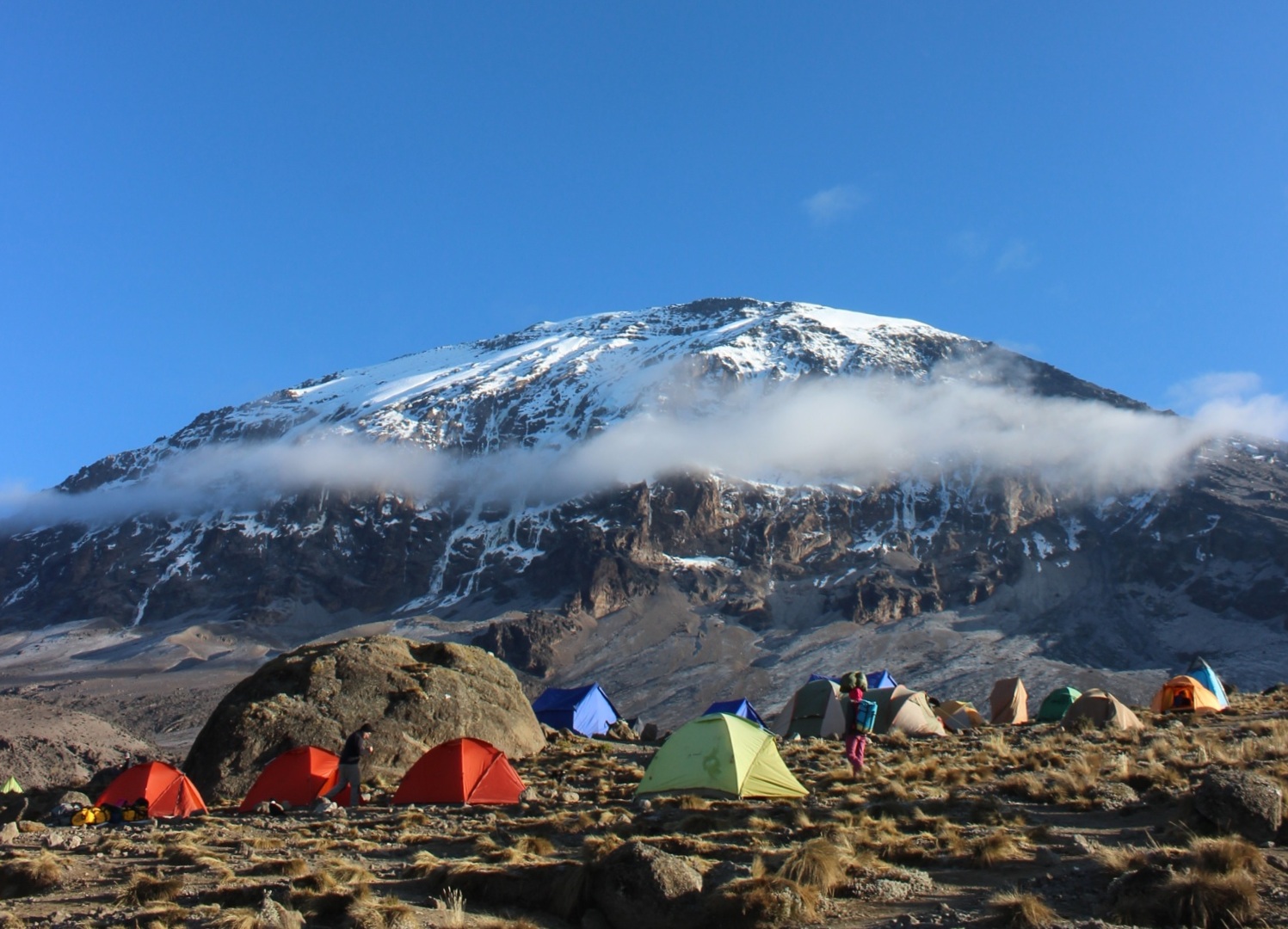Share This Article
Have you ever heard a silence so impenetrable, so complete that you can actually feel it? The world around you is so quiet and tranquil that you don’t want to move or make a sound for fear of disturbing the absolute peace and stillness that surrounds you.
Climbing out of my tent for a middle of the night toilet run at Barafu Camp on Mount Kilimanjaro, this was what greeted me. It was summit night and I couldn’t sleep. I had been tossing up whether to climb out of the warm nest of my sleeping bag to brave the cold or to put it off until I needed to get up a couple of hours later. I am so grateful that I did because it ended up being one of the most special moments of the entire trek. At that instant, when the entire world around me was asleep, the surrounding sea of tents full of hikers hoping to reach the Roof of Africa lay quiet. Above, the clear sky held more stars than I had seen in a long time and the mysterious peak of Kilimanjaro quietly watched. My quick toilet run ended up a twenty-minute shiver marvelling at our truly incredible world.
Standing at 5985m, Mt Kilimanjaro is the highest point in Africa and the tallest freestanding mountain in the world. Since it was first summited in 1889, around 30,000 people attempt to reach Uhuru Peak each year. Contrary to what Toto’s Africa leads us to believe, I was disappointed to find out that Kilimanjaro does not, in fact, rise like Olympus above the Serengeti. Although it looms above the small town of Moshi nestled at its base, Kili actually spends a lot of time hiding behind a thick curtain of clouds and it’s really only during the nights and the crisp mornings that you can truly take in her incredible beauty.
I’m not too sure what it is about humans that when we see a mountain, we feel a strong urge to climb to the top. Perhaps it’s the challenge of attempting something that seems impossible, or the mysterious allure that comes with reaching new heights. But when I travelled to Tanzania last year, equipped with my altitude meds, a bunch of hydrolyte, endless sheer determination and having done no exercise during my prior three months of travelling, I set out to climb to the Roof of Africa. My seven-day trek began in the lush green rainforest at the start of the Lemosho route. Within a few days my strong support team of five porters, my guide and I had ascended from the dense forest, through alpine forest and moorland to a barren alpine desert.
No other walkers had joined my climbing company’s group so during my time on the mountain I had a lot of time alone to think, reflect and take in everything I was experiencing. This was particularly enhanced because I had chosen to take one of the longer routes, which meant that whilst we spent most of the mornings hiking, during the afternoons I was usually free to relax, read or explore the camps. Further, the mantra of Kili is ‘pole pole’, meaning ‘slowly, slowly’ in Swahili. These are words that you will hear everywhere on the mountain, repeated by guides, porters and climbers. Essentially, this concept is constantly reiterated to ensure climbers have ample time to acclimatise to the high elevations and reduce the risks of altitude sickness. A lot of people climbing Mt Kilimanjaro choose the fastest and shortest routes; only taking around four to five days but these options have a much higher summit failure rate. By listening to the ‘pole pole’ advice and taking a little bit longer on the mountain by slowing down, not only can you have a higher chance at successfully reaching the top but also you have more time to enjoy the journey.
And I certainly did. Along the way to the top, I experienced some of the most incredible sights I have ever witnessed. From day three onwards, by day we were walking above the clouds with the form of Mt Meru on the horizon and by night, the twinkling lights of Moshi lit up below, mimicking their starry counterparts in the sky above.
Summit night. I was woken up at 11.30pm after about three hours sleep but the excitement to be making the push to the top supplanted the need for coffee. I bundled myself up in as many layers as possible and rolled out of my tent looking and feeling like the Michelin Man, but ready to conquer Kili. I could hear the rustling of tents all around me as the other groups began their preparations to reach the summit. Above and below us, other groups were on their way too, a twisting trail of headlights winding their way in a zigzag up the mountain. Pole pole. After a couple of hours of walking, Onex, my guide and I had overtaken all of the groups ahead of us. With nothing but the dark forms of rock ahead of us and the light of the stars guiding us, we kept on going, one step after another, pole pole. Past Stella Point and with only 300 vertical metres left to climb, as exhausted as I was, I felt stronger than ever. Pole pole, and before I knew it, we could see the sign at the summit. Last few metres and we had made it! It is hard to describe the incredible feeling of accomplishment that overcame me after finally reaching the top. Climbing Kili was something that I had been dreaming of for a long time and to have finally made it was unbelievable. Caught up in the moment and feeling so completely present that nothing else seemed to matter, it was one of those rare moments in life where you feel infinite.
I have always enjoyed spending time alone to reflect and climbing Kilimanjaro gave me the opportunity to unplug and focus on being fully present. The way that I was encouraged to approach the mountain, pole pole, is an attitude that I believe we can all try to incorporate in our everyday lives. I feel as though we try to maximise the use of our time in order to achieve as much as possible in the name of reaching goals and ticking boxes. Instead of thoroughly completing a task, we regularly look for short cuts or faster alternatives; such as the way many people take the shorter routes on Kilimanjaro. But this doesn’t always lead to success. I believe it is so much more important to slow down, spend a little more time and ensure you are fully immersed in the task at hand. We often get so lost in the mundaneness and repetitiveness of our daily routines that we forget to stop and appreciate this beautiful life that we have. If there’s one thing that I learned from Kili, it’s that we should try to slow down, live in the moment and enjoy the view along the way.
Images: Zoe Latham





